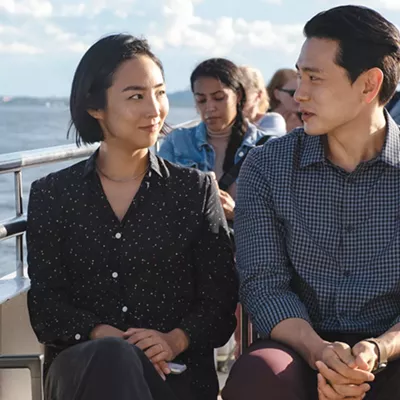I've often heard Tonya Harding's life story described as a uniquely American one, which I think says more about America than it does Tonya Harding. Growing up amidst poverty and abuse in Portland, her rise was as precipitous and perilous as her fall: She went from scrappy figure skating underdog to world-famous athlete to late-night TV punchline, all before she was 25.
It's the stuff of you-can't-make-this-up tabloid sensationalism, and the new biographical comedy I, Tonya adopts the lurid, volatile temperament of a National Enquirer piece, an approach this material probably deserves. It's furiously paced and foul-mouthed, and it deliberately clouds the truth surrounding its strangest details.
The movie opens with a title card informing us that it's been inspired by "irony-free, wildly contradictory interviews" by the real-life figures involved in Harding's life and career, which are then dramatized on-screen. Characters are also prone to interrupting the action to either corroborate or refute what's happening; other times they pop in to complain that they've been missing from their own story for too long.
That's an unusual stylistic gambit, but it's in keeping with the very contradictions that define Tonya Harding as a public figure. She's played here by Margot Robbie, who has never been better. She has the steely-eyed resolve to prove all her critics wrong, especially her pushy mother (Allison Janney, who skates away with the movie), a chain-smoking monster in a thrift-store fur coat and a pageboy haircut that suggests a disturbing affinity for Dorothy Hamill.
Harding, all sharp edges and screw-you attitude, didn't fit the cookie-cutter ideal of a traditional figure skater, pugnacious and excitable in a sport that values gentility and fastidiousness. And yet her talent was undeniable. In 1991, she became the first female skater to land two triple axel jumps during a competition, a feat that seemed to surprise and delight her even more than the spectators.
All of this leads to what everyone in the film gingerly refers to as "the incident," which is the reason anyone likely still remembers Harding. Her abusive ex-husband Jeff Gillooly (Sebastian Stan) allegedly orchestrated an attack on her competitor Nancy Kerrigan, hiring goons to crack Kerrigan's kneecap with a club in what he hoped would leave an open spot on the '94 Olympic team.
Or maybe he wasn't involved. That "wildly contradictory" claim that starts the film defines the whole thing, and we therefore approach what we're told with a healthy dose of skepticism. But I, Tonya is resolute in one thing: its conviction that Harding knew nothing of the Kerrigan assault before it happened. There's no doubt that Harding was a victim of Gillooly's violent temper, and her eventual criminal sentence may have been a bit harsh, but I'm not convinced she was quite as innocent as the movie suggests.
There's a sense, then, that the movie wants to have its sickeningly rich cake and eat it, too: It invites us to gleefully laugh at how trashy and clueless its characters are, only to turn around and chastise us for laughing in the first place. This is no more apparent than during a moment near the end of the film in which Tonya looks directly into the camera and effectively tells us we're as complicit in her professional downward spiral as her actual abusers.
She may have a point, in a way. But I'm not certain this film quite earns the right to make it.
What the movie does do well is ask us to consider the complexities of a person we perhaps assumed didn't have any. We often forget that there's a human being behind those old Saturday Night Live and David Letterman jokes, someone who likely never could have had a fair shake in life. Tonya ended up fulfilling the depressing prophecy laid out by her biggest skeptics, but damn it, she found fame through infamy. And what's more American than that? ♦



















